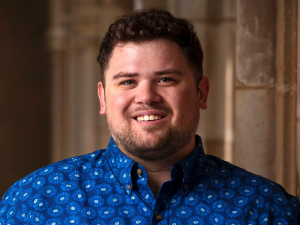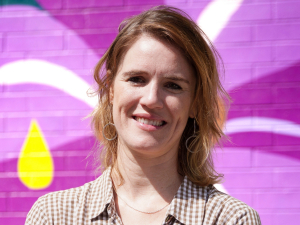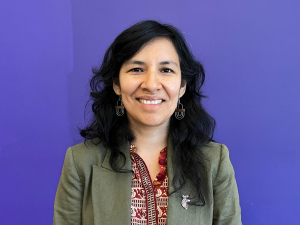
Global Cultural Innovators Join Duke Romance Studies
In Duke Romance Studies, classes focused on history and culture shed light on the complexities of the human experience. Students not only learn the nuances of Romance languages, but also explore the global impact of cultures through diverse lenses like art, critical race studies, gender and sexuality.
Three new faculty who are joining the department this fall, Eric Disbro, Katryn Evinson and Angélica Serna Jeri, are global cultural innovators whose interdisciplinary work engages with some of today’s most pressing social questions.
“The department's aim was to recruit faculty who engage in critical inquiry across our languages, spaces, periods and methods,” said Romance Studies department chair Martin Eisner. “That might mean working at the intersection of Indigenous languages and environmental studies in Latin America, as Professor Serna Jeri does, or investigating gender in the Francophone pacific like Professor Disbro, or analyzing contemporary art and radical politics in modern Spain, as in Professor Evinson's work.”
Creating Archipelagos of Identity
“What if we looked at water not as this thing that separates people, but as something that connects people?” asked Eric Disbro, a specialist in Francophone island regions including the Indian Ocean, Oceania and the Caribbean.
Disbro, who holds a dual Ph.D. in French & Francophone studies and Women’s, Gender, and Sexuality Studies, says we can learn a lot about the world from island nations.
His work focuses on queer and transgender studies in these regions, looking at local LGBTQIA+ traditions and how they can expand the understanding of what it means to inhabit a gendered body, and how it intersects with care work.
“I’m looking at how contemporary writers and artists are depicting queer and trans people, and how that reflects the actual queer and trans communities in those regions,” Disbro said.
He wants to take a comparative and transnational approach to trans studies in the field of Romance Studies, expanding on available or formal frameworks and methodologies for integrating trans studies into the discipline.
One of the things that excites him most about bringing his research and teaching to Duke is the Department of Romance Studies' commitment to growing and protecting queer and trans studies.
“I wanted to be in a place where the non-traditional work that I do would be celebrated,” he said.
Breaking Art
Like Disbro, Katryn Evinson was drawn to Duke as a university that supports bold interdisciplinary thinking.
“The kind of work that can be done within Romance Studies is very versatile,” she said. “I'm excited about the opportunities and support for research, and how passionate the scholars here are.”
Evinson’s research examines creative resistance in Spain. She uses a historical lens to look at the ways artists have practiced — and are practicing — interruptions of capitalism.
Her experience living in Barcelona during the 2008 global financial crisis influenced her research on what she calls “sabotage practices” in the art world.
“I started to see a lot of exhibitions that were practicing forms of interruption or disruption, not just in the art world, but in literature as well. I started asking myself, ‘Why at this time?’”
In graduate school at Columbia University, Evinson was able to take her questions and turn them into a unique project. She logged over 40 hours of interviews with artists, museum curators and directors in Barcelona to examine what was happening in that moment to cause an explosion in these sabotage practices.
Evinson is also interested in other ways in which capitalism has intersected with and shaped the art world.
For example, to enter the European Union, Spain had to commit to dismantling its industrial fabric. Cities were given funding from the EU to help with this push, and now places like Bilbao, a former industrial hub, have big museums that cost millions.
“I'm interested in thinking about how artists are reacting to that kind of transformation,” Evinson said.
Indigenous Language and Bilingual Speakers
Angélica Serna Jeri grew up drawn to storytelling and history in a Quechua-Spanish bilingual family in Peru’s capital, Lima, in her family’s home in Andahuaylas, and in the central Andes city of Huaraz. Her love of and interest in the dynamic connections between writing and verbal art led her to spend time between old books, archeological sites and visits to vital and storied places in the Andes. Those experiences now guide her scholarly exploration of the Andean region and the Quechua language family.
Serna Jeri is interested in how diverse materials from the colonial period to the present —such as Pre-Columbian ceramics and textiles, cartographic documents, and narratives written by bilingual speakers of indigenous languages and Spanish — can speak to the history of the environment and ongoing vitality of material culture in the region. Motivated by the importance of these themes to indigenous communities in the Andes today, Serna Jeri weaves these stories of resistance and decolonization into her research and teaching.
“I believe looking at how these objects and texts reflect multiple understandings of relationships among humans and their surroundings can help us decolonize our relationship with the land beyond the logic that was the basis for colonialism and continues to shape our world today,” she said.
“I’m excited to continue this research at Duke, in a department with a strong history in decolonial studies,” Serna Jeri said. “There are so many multidisciplinary opportunities for collaborating with students and faculty on Indigenous languages and cultures.”
Celebrating Collaborative Study
The Romance Studies department looks forward to engaging with the unique perspectives these scholars bring. With a shared commitment to interdisciplinary exploration and a deep passion for their fields, this new cohort is poised to push the boundaries of Romance Studies, fostering an academic environment where collaboration and innovation thrive.
“With these faculty, we not only found their projects compelling on their own terms, but also discovered an unexpected convergence in their commitment to the environmental humanities, which they bring to both their research and teaching,” said Eisner. “I know they look forward to interacting with students and getting to know Duke over the next year.”



